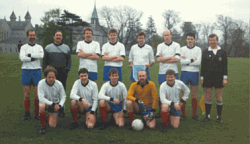

The University of Liverpool Convocation Football Club (to give it its full title) was founded in 1973 by that great eccentric Brian Holder and the elusive Clive Skilbeck, two post-graduates of the University, whose great love of Football was in inverse proportion to their ability to play.
They advertised for GENTLEMEN, of like mind, to join them and the Club archives hold the famous letter of application from legendary Club Captain Terry Caslin whose C.V. states that he had retired from competitive football, but thought he might be able to carry on for a bit longer 'in the right context'.
The first game was played on 1 December 1973 and not surprisingly was lost 13-2 to Crewe Nomads. But nothing daunted, other games were arranged with those clubs in the North West who play on the 'friendly circuit' and many of these traditional fixtures continue to this day, notably Liverpool Ramblers AFC, a great influence on Convocation s chap-like qualities.
The Club entered the Liverpool Old Boys League for the season 1974/75 but slumbered quietly in its lowest division for three years. Promotion was gained by the rather useful 77/78 side, but the irregular hours of the strong 'Medical' section of the squad resulted in a lack of stability and immediate relegation.
The early 80's brought a wind of change. The old order, who had served the Club through its early years, was replaced by younger blood. Under the dynamic leadership of Mike Edwards and John Flamson there was a period of sustained growth and, by Convocation standards, great success. The popularity of the Club meant that one team couldn't meet the needs of the increasing numbers eager to play and a Second Team was created to fulfil the friendly fixtures and it joined the Liverpool Old Boys League in 1985.
At this period the first team enjoyed a fantastic spell, rising from Div 6 to Div 1 of the Old Boys League, although in typical Convocation style, they never won a Division. They also reached the final of The Northern Cup in 1988 being narrowly beaten in an exciting contest.
1984 saw a major upheaval when the venue for post match analysis moved from the Rose of Mossley to the Storrsdale where sage pronouncements and merry quips still ring out of a Saturday tea-time, although in recent years Convocation has also shared its patronage with the Gardener s Arms in Woolton and Ba Reeva in Mossley Hill, a sign of its off-field upward mobility!
1989 saw the beginning of what has become the most successful of Convocation's ventures - European Football! Success on the field has been limited but little did those pioneers (pictured above), who assembled in the Caernarvon Castle, all of an April evening, realise that they were beginning an adventure that would lead to such wonderful trips to Ireland and Germany. It has been equally satisfying (well almost!) entertaining our good friends from abroad in Liverpool.
December 1985 saw Convocation put out three sides for the first time. This happened on numerous occasions in the late Eighties and eventually the Club fielded a regular Third Team in 1991/92. Although there was no shortage of new recruits to the club, there was a shortfall in skill! The Third Team plumbed hitherto unknown depths of ineptitude and lasted for only the one season before the bulk of the squad transferred to Liverpool Cavaliers.
Following the frenzy of the 'Eighties' (the Club played 102 matches in 1987/88) the 'Nineties' were a decade of quiet maturity, mirroring the calming influence of Paul Dickson. The First Team stayed in Division 1 for five years before dropping gently to the middle reaches of the Old Boys' League and the Second Team, having propped up the League for long enough, withdrew to the sanctuary of the 'friendly circuit . The highlight of the 'Nineties' was probably reaching the final of the St. George's Cup, when we were beaten in an eleven goal thriller in, of all places, Goole.
The Naughties saw Convocation established as a global brand. The First Team continued to grace the Old Boys League with unpredictable football, developing into a Europa if not Champions League outfit, whilst the Second Team ventured further into Wales like some latter-day Llewellyns in search of their roots or simply the ground in another unpronounceable village. The Sealand Cup was added to the trophy cabinet in 08/09 recompense for the cup final defeats in the previous two decades.
But, notwithstanding this diversion, both Teams as results would testify throughout the decade seemed preoccupied by thoughts of exotic places or at the very least the destination for the next tour. Kit bags read like a UN declaration or a manic football commentator s warm-up: Mannheim, Speyer, Heidelberg, Cologne, Dublin, Isle of Man, Newcastle Co Down, Cornwall, Kilkenny and the mother of all mojitos, Cuba. Still, few retired from the game; still men for all seasons and all places such is the way of Convocation, a byword for mystery and style.
Emrys Hughes Invitational Trophy Winners, 2019
Friendship Masters Plate Winners, 2023
Friendship Masters Shield Winners, 2024
